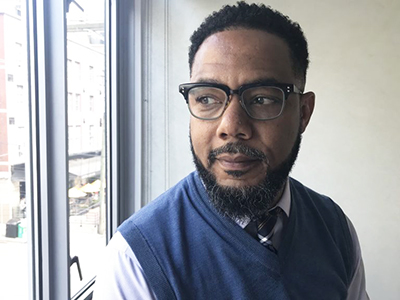
On Thursday, April 22 at 11 am EDT, Yale Library, Yale’s SEICHE Center for Health & Justice, and Yale’s Department of African American Studies are co-sponsoring an important event that shines a spotlight on key challenges in America’s prison system. "In Our Backyard: How the Prison Boom Transformed America" will be presented by Dr. John Eason, Associate Professor of Sociology at the University of Wisconsin-Madison and Director of the UW Justice Lab, as part of the SEICHE Center’s Spring Seminar Series. Dr. Eason’s research challenges existing models—and develops new theories—of community, health, race, punishment, and rural/urban processes.
This seminar builds upon the library’s already well-established partnership with the SEICHE Center. Following the call from Yale’s leadership for researchers and teams to step up to address challenges arising from the pandemic, the Yale COVID Mapping team was established. Born out of this initiative, the SEICHE Center and the library began to explore the spatial relationship between correctional facilities and the community spread of COVID-19 using Geographic Information Systems (GIS) technology. The Yale COVID Mapping team, led by Dr. Jill Kelly, lecturer at the Yale School of Public Health, advised and conducted geospatial analyses to process and visualize datasets on correctional facility locations, populations, and COVID-19 rates with members of the SEICHE team. The results in the form of visual StoryMaps, offered the compelling conclusion that the COVID-19 pandemic has unmasked the long-standing health inequalities in America’s correctional system.
Dr. Eason’s talk will be moderated by Callie Ginapp, a third-year medical student at Yale School of Medicine. It will be live via Zoom at 11 am on Thursday, April 22. All are welcome! Register online here.
Dr. John Eason
Professor Eason is an Associate Professor in the Department of Sociology at the University of Wisconsin-Madison and a member of UB's inaugural Center for Diversity Innovation's Distinguished Visiting Scholar cohort for 2020-21. His research interest challenges existing models and develops new theories of community, health, race, punishment, and rural/urban processes in several ways. By tracing the emergence of the rural ghetto he establishes a new conceptual model of rural neighborhoods. These relationships are explored through his book, Big House on the Prairie: Rise of the Rural Ghetto and Prison Proliferation, at the University of Chicago Press. As the Founder and Director of the UW Justice Lab, we focus on reducing/ending racial, economic, and health disparities across the rural-urban interface by critically examining the causes of spatial inequality and offering creative solutions to address these issues.
The SEICHE Center for Health and Justice’s work focuses on the health-harming impacts of mass incarceration. It identifies and applies strategies to improve the health of individuals, families, and communities impacted by mass incarceration both locally in Connecticut and globally. Named after a seiche wave, or an oscillating wave that erupts from stagnant water to cause huge disruptions in the status quo, the Center aims to bring about massive, structural changes to systems built upon and maintained by racism and other forms of oppression